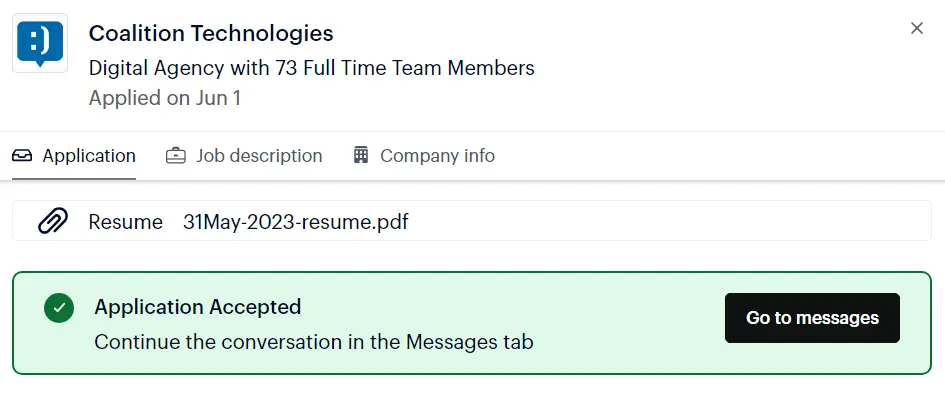How to Track Job Applications Effectively

Tracking job applications effectively is a game-changer to landing your dream job.
Key Takeaways:
- Using a spreadsheet is the most effective way to make a job applications tracker.
- An effective job applications tracker keeps you organized and puts you up for career success.
- Update your job applications tracker regularly to maintain accurate information.
Finding a job can often feel like a rollercoaster ride of emotions - excitement, anticipation, and at times, sheer frustration. It's a whirlwind journey that requires careful planning and organization.
But here's the thing: staying organized throughout your job search is more than just keeping tabs on which companies you've applied to. It's about creating a system that helps you monitor your progress, follow up effectively, and make data-driven decisions to improve your strategy.
The Ultimate Guide To Tracking Job Applications Effectively
An organized job search lets you stay on top of application deadlines, ensuring you never miss an opportunity. It will also help you to easily track your progress and identify areas for improvement.
Knowing where you stand in your application process brings a sense of control and empowers you to make strategic moves.
In this blog post, we'll walk you through effective strategies to track your job applications like a pro. Say goodbye to the chaos and confusion, and welcome a streamlined job search that sets you up for success.
Let's get started!
Tools and Techniques for Job Application Tracking

We’ll take you right into the meaty part.
For someone that sends hundreds of applications every month, or even every week, relying solely on their memory power to track those applications just wouldn’t cut it.
You’ll need some help to do it. And that’s where these tools and techniques will come in handy for you.
Creating a spreadsheet or tracker
Let's start with a classic: the good old spreadsheet or tracker.
If you're a fan of organizing information in a neat and structured way, this method is for you. Simply create a spreadsheet using software like Microsoft Excel or Google Sheets, and voila! You have a customizable job application tracking system at your fingertips.
Here's what you can include in your spreadsheet:
- Company Name: Keep track of the companies you've applied to.
- Job Title: Note down the specific position you've applied for each company.
- Application Date: Record the date you submitted your application.
- Application Status: Monitor the progress of your application.
- Follow-up Dates: Set reminders for follow-up actions like sending thank-you emails or making phone calls.
Notes: Jot down any additional information or observations about the application process or company.
By having all this information in one place, you'll be able to see your progress at a glance, identify any gaps in your applications, and keep tabs on important follow-up dates.
Plus, you can customize your spreadsheet to suit your preferences and add any additional columns that are relevant to your job search.
Using online job search platforms
Platforms like LinkedIn, Indeed, and Glassdoor offer not only a vast selection of job listings but also built-in tools to help you track your applications effectively.
One of the key advantages of using these platforms is that they often provide a built-in tracking system.
When you apply for a job through the platform, it automatically keeps a record of your application details, including:
- The position.
- Company.
- Application date.
- And even if/when your application was viewed or downloaded!
Pretty neat, right?
Keeping track of application deadlines
Missing application deadlines can be a major setback in your job search. To avoid this, it's crucial to keep a close eye on application deadlines and stay ahead of the game.
One effective technique is to create a calendar specifically dedicated to your job search.
Use a digital calendar application like Google Calendar or Microsoft Outlook to schedule reminders for upcoming application deadlines.
Set reminders a few days in advance to give yourself enough time to complete the application and any necessary preparations. Treat these reminders as non-negotiable appointments with your future career!
Documenting communication with employers
Once you start engaging in conversations with potential employers, try to keep a record of your communication. Documenting your conversations not only helps you stay organized but also allows you to reference important details when needed.
Create a separate folder or section in your email inbox specifically for job-related communications. When you receive an email from a potential employer, move it to this folder or apply specific labels to keep things organized.
This way, you'll have all the necessary information readily available whenever you need to follow up or refer back to a previous conversation.
If you prefer a more centralized approach, consider using a note-taking application like Evernote or Notion. Create separate notes for each company or position, and jot down key details from your interactions, including:
- Interview dates.
- Names of interviewers.
- And any important points discussed.
By maintaining thorough documentation, you'll demonstrate professionalism, stay on top of important updates, and have a solid foundation for future communication with potential employers.
Creating a follow-up schedule
Following up after submitting an application or attending an interview is a critical step in the job search process. It shows your:
- Enthusiasm.
- Attention to detail.
- And commitment to the role.
To stay organized and ensure you don't miss any follow-up opportunities, it's helpful to create a follow-up schedule.
In your job application tracker or calendar, include designated follow-up dates for each application or interview. These dates should be strategically chosen to allow sufficient time for the employer to review your application or make a decision.
When following up, consider using a mix of communication channels. Sending a personalized email is a common practice, but you can also consider making a phone call or connecting via LinkedIn.
Adapt your approach based on the employer's preferred method of communication.
Remember, timing is key. Don’t expect your employer to review your application within a few hours of sending it. Allow them at least 1-2 weeks of time, or even a month.
Elements of an Effective Job Application Tracker

It's time to delve into the key elements of an effective job application tracker. Think of it as the secret sauce that will supercharge your organization and keep you one step ahead in the competitive job market.
While having a tracking system in place is a great start, it's equally important to ensure that your tracker has the right ingredients to make it truly effective.
A well-designed job application tracker goes beyond simply listing the companies you've applied to or the dates you submitted your applications. It encompasses crucial details and features that will enhance and maximize your:
- Job search experience.
- Efficiency.
- And your chances of success.
In this section, we'll break down the essential elements of an effective job application tracker. Let’s jump into it!
Company and position information
Having comprehensive details about the companies and positions you've applied to is essential.
In your job application tracker, make sure to include the following information:
- Company name.
- Job title.
- Application date.
By having these details readily available, you can easily track your progress and ensure that you have a clear overview of the companies and positions you're targeting.
Application materials and status
An effective job application tracker should keep track of your application materials and the status of each application.
Here's what to include:
- Resume and Cover Letter: Note whether you've submitted a resume and cover letter for each application. You can either link the documents or provide a brief description of the content.
- Application Status: Monitor the progress of your application, such as "Submitted," "Under Review," "Interview Scheduled," or "Offer Received." Keeping track of the status helps you know where you stand and when to take appropriate action (Such as a follow-up).
Contact information for employers
To maintain clear and open lines of communication with potential employers, it's crucial to have their contact information readily available.
Try to add these details to your job application tracker:
- Note down the name and email address of the primary contact person at the company, such as the hiring manager or recruiter.
- If you've interacted with multiple individuals during the application process, include their names and contact information as well.
Once you have these details noted down, try to find their LinkedIn profiles as well. If they have a LinkedIn profile, add that as well to the job application tracker.
This will help immensely for easy reference and networking. It also allows you to reach out promptly for follow-up or send thank-you messages after interviews. Ultimately, it’ll display your professionalism and attention to detail, giving you an edge over other applicants.
Notes on interview and follow-up communication
Your interview itself has loads of details that you must not miss. That's why it's important to keep detailed notes on these interactions within your job application tracker.
Here's what to include:
- Interview Details: Record the date, time, and format (e.g., in-person, phone, video) of each interview.
- Interviewer Names: Jot down the names of the interviewers to ensure you address them correctly and can reference them in future communications.
- Questions and Answers: Take notes on the questions asked during interviews and your responses. This helps you review your performance and tailor your answers for future interviews.
- Follow-Up Actions: Document any follow-up actions you need to take, such as sending thank-you emails or making phone calls.
Personal notes and reflections
An effective job application tracker should leave room for personal notes and reflections. This section allows you to capture your thoughts, observations, and insights throughout the job search process.
Here are some ideas for what to include:
- Write down your impressions of the company culture, values, or mission statement during your research or interview process.
- Reflect on what you've learned from each application or interview experience. This can help you refine your job search strategy and improve future applications.
- Identify areas where you can enhance your skills or qualifications based on feedback received or self-assessment.
Personal notes and reflections serve as a valuable resource for growth and self-improvement. They enable you to continuously refine your approach, make informed decisions, and increase your chances of finding the perfect job match.
Best Practices for Staying Organized and Efficient

It’s time for some best practices that will help you stay organized and efficient throughout your job search journey.
After all, staying on top of your game and maintaining a well-oiled system can make all the difference in landing that dream job.
Setting aside dedicated time for job searching and application tracking
One of the best practices is to carve out dedicated time for job searching and application tracking. Treat it like an important appointment with yourself and commit to it.
Consider creating a consistent schedule for your job search activities. It could be a couple of hours each day or specific days of the week.
Essentially, sticking to a routine will help you establish a sense of discipline and create a productive habit.
Updating the tracker regularly
An effective job application tracker is only as good as the information it contains. To stay on top of your game, it's vital to update your tracker regularly.
As your job search progresses, new opportunities arise, and your application status evolves. By updating your tracker consistently, you maintain an accurate and up-to-date record of your applications. This allows you to:
- Track your progress.
- Follow up on deadlines.
- And make informed decisions about your job search strategy.
As we mentioned, this, too, can be a routine for you. Allocate a specific time to update your tracker:
- Enter new application details.
- Note any status changes.
- And add any relevant notes or communication updates.
The core purpose of updating the tracker is to ensure accurate data. Just keep in mind your job application tracker is useless with inaccurate data.
Prioritizing job applications based on personal preferences and job requirements
With countless job opportunities out there, it's essential to prioritize your applications based on your personal preferences and job requirements.
Learn to focus your energy on opportunities that align with your:
- Career goals.
- Interests.
- And qualifications.
This targeted approach increases your chances of finding the right fit and saves you time and effort in the long run.
Assessing each job opportunity based on criteria such as:
- Job requirements.
- Company culture.
- Location.
- And potential for growth.
This evaluation process helps you identify your top choices and allocate your resources accordingly.
Keep in mind that it’s always quality over quantity. Tailoring your applications to positions that truly resonate with you increases the likelihood of success and ensures a more fulfilling job search experience.
Maintaining a positive attitude and outlook
The job search process can be challenging and sometimes discouraging. But a positive mindset can empower you to:
- Navigate obstacles.
- Bounce back from rejections.
- And persevere with enthusiasm.
A positive mindset leads to increased productivity and better problem-solving abilities. It also enhances your overall well-being and reduces stress levels during the job search process.
Don’t forget to celebrate small wins, practice self-care, and surround yourself with a supportive network.
Just embrace the journey as an opportunity for growth and learning, and maintain a positive outlook that propels you forward.
Benefits of Effective Job Application Tracking

Ok, time to explore the exciting world of benefits that come with effective job application tracking.
Trust us; it's not just about keeping things organized—it's about unlocking a whole array of advantages that will turbocharge your job search success.
We’ll get right into it!
Increased organization and efficiency
Implementing an effective job application tracking system brings a world of organization and efficiency to your job search.
When you have a centralized and well-structured tracker, you can easily access all your application details, deadlines, and communication records in one place.
That means no more digging through emails or trying to remember which positions you've applied to. With a few clicks, you'll have a clear overview of your progress and status.
Reduced stress and anxiety
We know job searching is stressful and anxiety-inducing. But effective application tracking can help alleviate some of those pressures.
Knowing that you have a well-organized system in place brings peace of mind. You no longer have to worry about missing application deadlines or forgetting crucial details from previous interactions with potential employers.
So, take a deep breath and embrace the calming effects of an organized and stress-free job search. With your tracker by your side, you'll tackle each step of the process with confidence and composure.
Improved follow-up and communication with potential employers
One of the most significant benefits of effective job application tracking is the ability to excel in follow-up and communication with potential employers.
You can easily reference the dates of your applications, the names of the contacts, and the status of each application. This enables you to send timely and tailored follow-up emails or make phone calls that demonstrate your genuine interest and professionalism.
Leverage the power of your tracker to build strong connections with potential employers. Maintain open lines of communication, show your enthusiasm, and leave no stone unturned in your follow-up efforts.
Increased chances of success in the job search
When you stay organized, efficient, and proactive in your job search, you position yourself as a standout candidate.
You're able to:
- Track your progress.
- Identify patterns of success.
- And make informed decisions about your job search strategy.
Pretty neat, isn’t it?
Conclusion
An organized job search is not just about being efficient—it's about taking charge of your career destiny. It allows you to:
- Stay on top of your applications.
- Make informed decisions.
- And present yourself as a standout candidate to potential employers.
An organized job search reduces stress, enhances your follow-up efforts, and ultimately increases your chances of landing your dream job.
It's time to implement an effective job application tracking system and embark on your journey to success.
Choose the tools and techniques that resonate with you, tailor your tracker to your needs, and commit to staying organized and efficient throughout your job search.
A little effort in setting up your system will pay off tremendously in the long run.
Good luck, and stay organized!
Follow us for more knowledge about remote work
We'll be publishing new articles every week, and new social media content every day. If you enjoyed this article, follow us on Twitter or Linkedin, and stay in the loop. Share our content and drop us a comment there. Let's help more people learn about remote work.


